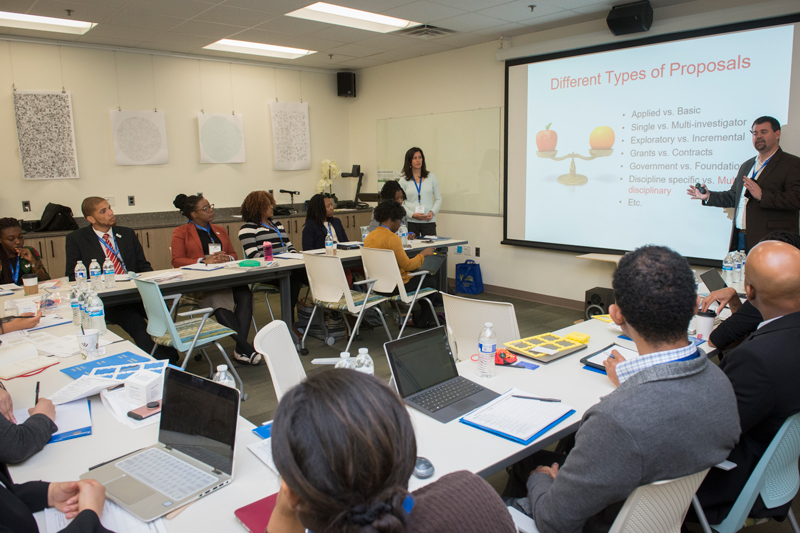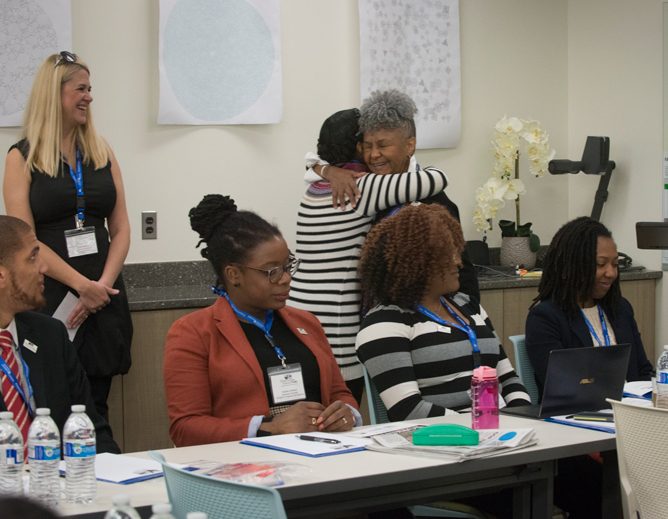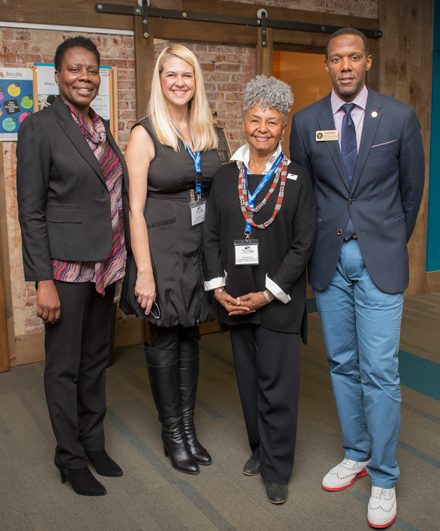


Disaster scholars network
Photo by Wenbo Fan November 15, 2017
Graduate students gather for Bill Anderson Fund workshop
William A. Anderson had been a disaster scholar and a pioneering researcher for three decades when he wrote a report in 1996 about the need for more diversity in the ranks of his profession.
More than 20 years later, at the University of Delaware on Nov. 10, his widow, Norma Anderson, told a group of graduate students gathered for a workshop at the Disaster Research Center (DRC) that, despite progress, the lack of diversity among scholars, researchers and practitioners remains a problem.
“Ladies and gentlemen, this is why you are here,” she said, adding that her husband “would have been so delighted” to see the group assembled at UD.

The 19 students, from several universities across the U.S. including three from UD, were all Bill Anderson Fund (BAF) fellows, supported by the organization Norma Anderson founded in 2014 to honor her husband’s legacy. Earlier this year, BAF moved to UD, which now serves as its academic home and flagship institution.
Bill Anderson was an early alumnus of the DRC, earning his doctorate in sociology at Ohio State University in 1966 when the center was housed there and maintaining ties after it moved to Delaware in the 1980s.
At the BAF workshop, Norma Anderson read from his 1996 report to the Aspen Global Change Workshop, which detailed his concern that underserved communities are disproportionately vulnerable to the risks and impact of natural disasters.
“The poor and people of color, especially minority women, are underserved when it comes to society’s ability to make resources available for mitigating, preparing for, and recovering from hurricanes, earthquakes, and other natural disasters,” Bill Anderson wrote. “Members of these groups are generally at greater risk to disasters, and have fewer resources with which to respond to and recover from them.”

He outlined several actions that could help empower these underserved groups, starting with efforts to bring members into “the research professions relevant to natural disaster reduction, including engineering, the physical sciences and the social sciences.” Women and minorities, he wrote, “represent a relatively untapped resource in these fields.”
The fellows attending the workshop embody the continuing efforts to improve diversity in what is an interdisciplinary field, Norma Anderson said. Regularly scheduled workshops and conferences are among the programs that BAF organizes to support the students’ academic work and help them build networks for the future.
“You’re all here together building a cohort,” David Wilson, associate dean for the social sciences in the College of Arts and Sciences, said as he welcomed the participants to the workshop. “You’re going to need a team of people to support you throughout your careers.”
Carol E. Henderson, UD’s vice provost for diversity, told the students that the journey to earning a doctoral degree “is not an easy one, but an important one.” She also encouraged them to build a strong network of fellow students and future colleagues.
“I know you are going to do wonderful things—each of you—to impact the world,” she said.
The workshop included sessions focused on crafting grant proposals, participatory action research, community engagement, quick response training in disaster research and oral presentations by BAF fellows. Students had lunch at UD’s student-operated Vita Nova restaurant and viewed the University’s Paul R. Jones Collection of African American Art.
Tricia Wachtendorf, co-director of the DRC, thanked Henderson, Wilson and CAS Dean George Watson for their work in bringing BAF to the University.
“Bill Anderson is not only a legend in the field of disaster scholarship,” she said, but also a close friend and mentor to many in the DRC. A national search is being conducted to select a director for the flagship BAF initiative.
The workshop was supported by a gift to the DRC from Russell Dynes, the center’s founder and professor emeritus, and was co-sponsored by CAS, the School of Public Policy and Administration, Department of Geography and Delaware Emergency Management Agency.
Contact Us
Have a UDaily story idea?
Contact us at ocm@udel.edu
Members of the press
Contact us at 302-831-NEWS or visit the Media Relations website

